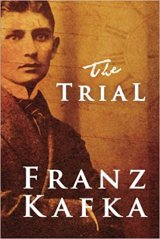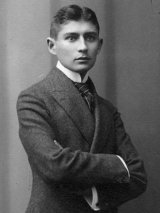The Trial Page #2
The Trial is a novel written by Franz Kafka between 1914 and 1915 and published posthumously on 26 April 1925. One of his best-known works, it tells the story of Josef K., a man arrested and prosecuted by a remote, inaccessible authority, with the nature of his crime revealed neither to him nor to the reader. Heavily influenced by Dostoevsky's Crime and Punishment and The Brothers Karamazov, Kafka even went so far as to call Dostoevsky a blood relative. Like Kafka's other novels, The Trial was never completed, although it does include a chapter which appears to bring the story to an intentionally abrupt ending.
Genre: Fiction
Genre: Fiction
- Year:
- 1925
- 1,842 Views
He still had time. "Allow me," he said, and hurried between the two policemen through into his room. "He seems sensible enough," he heard them say behind him. Once in his room, he quickly pulled open the drawer of his writing desk, everything in it was very tidy but in his agitation he was unable to find the identification documents he was looking for straight away. He finally found his bicycle permit and was about to go back to the policemen with it when it seemed to him too petty, so he carried on searching until he found his birth certificate. Just as he got back in the adjoining room the door on the other side opened and Mrs. Grubach was about to enter. He only saw her for an instant, for as soon as she recognised K. she was clearly embarrassed, asked for forgiveness and disappeared, closing the door behind her very carefully. "Do come in," K. could have said just then. But now he stood in the middle of the room with his papers in his hand and still looking at the door which did not open again. He stayed like that until he was startled out of it by the shout of the policeman who sat at the little table at the open window and, as K. now saw, was eating his breakfast. "Why didn't she come in?" he asked. "She's not allowed to," said the big policeman. "You're under arrest, aren't you." "But how can I be under arrest? And how come it's like this?" "Now you're starting again," said the policeman, dipping a piece of buttered bread in the honeypot. "We don't answer questions like that." "You will have to answer them," said K. "Here are my identification papers, now show me yours and I certainly want to see the arrest warrant." "Oh, my God!" said the policeman. "In a position like yours, and you think you can start giving orders, do you? It won't do you any good to get us on the wrong side, even if you think it will - we're probably more on your side that anyone else you know!" "That's true, you know, you'd better believe it," said Franz, holding a cup of coffee in his hand which he did not lift to his mouth but looked at K. in a way that was probably meant to be full of meaning but could not actually be understood. K. found himself, without intending it, in a mute dialogue with Franz, but then slapped his hand down on his papers and said, "Here are my identity documents." "And what do you want us to do about it?" replied the big policeman, loudly. "The way you're carrying on, it's worse than a child. What is it you want? Do you want to get this great, bloody trial of yours over with quickly by talking about ID and arrest warrants with us? We're just coppers, that's all we are. Junior officers like us hardly know one end of an ID card from another, all we've got to do with you is keep an eye on you for ten hours a day and get paid for it. That's all we are. Mind you, what we can do is make sure that the high officials we work for find out just what sort of person it is they're going to arrest, and why he should be arrested, before they issue the warrant. There's no mistake there. Our authorities as far as I know, and I only know the lowest grades, don't go out looking for guilt among the public; it's the guilt that draws them out, like it says in the law, and they have to send us police officers out. That's the law. Where d'you think there'd be any mistake there?" "I don't know this law," said K. "So much the worse for you, then," said the policeman. "It's probably exists only in your heads," said K., he wanted, in some way, to insinuate his way into the thoughts of the policemen, to re-shape those thoughts to his benefit or to make himself at home there. But the policeman just said dismissively, "You'll find out when it affects you." Franz joined in, and said, "Look at this, Willem, he admits he doesn't know the law and at the same time insists he's innocent." "You're quite right, but we can't get him to understand a thing," said the other. K. stopped talking with them; do I, he thought to himself, do I really have to carry on getting tangled up with the chattering of base functionaries like this? - and they admit themselves that they are of the lowest position. They're talking about things of which they don't have the slightest understanding, anyway. It's only because of their stupidity that they're able to be so sure of themselves. I just need few words with someone of the same social standing as myself and everything will be incomparably clearer, much clearer than a long conversation with these two can make it. He walked up and down the free space in the room a couple of times, across the street he could see the old woman who, now, had pulled an old man, much older than herself, up to the window and had her arms around him. K. had to put an end to this display, "Take me to your superior," he said. "As soon as he wants to see you. Not before," said the policeman, the one called Willem. "And now my advice to you," he added, "is to go into your room, stay calm, and wait and see what's to be done with you. If you take our advice, you won't tire yourself out thinking about things to no purpose, you need to pull yourself together as there's a lot that's going to required of you. You've not behaved towards us the way we deserve after being so good to you, you forget that we, whatever we are, we're still free men and you're not, and that's quite an advantage. But in spite of all that we're still willing, if you've got the money, to go and get you some breakfast from the café over the road."
Translation
Translate and read this book in other languages:
Select another language:
- - Select -
- 简体中文 (Chinese - Simplified)
- 繁體中文 (Chinese - Traditional)
- Español (Spanish)
- Esperanto (Esperanto)
- 日本語 (Japanese)
- Português (Portuguese)
- Deutsch (German)
- العربية (Arabic)
- Français (French)
- Русский (Russian)
- ಕನ್ನಡ (Kannada)
- 한국어 (Korean)
- עברית (Hebrew)
- Gaeilge (Irish)
- Українська (Ukrainian)
- اردو (Urdu)
- Magyar (Hungarian)
- मानक हिन्दी (Hindi)
- Indonesia (Indonesian)
- Italiano (Italian)
- தமிழ் (Tamil)
- Türkçe (Turkish)
- తెలుగు (Telugu)
- ภาษาไทย (Thai)
- Tiếng Việt (Vietnamese)
- Čeština (Czech)
- Polski (Polish)
- Bahasa Indonesia (Indonesian)
- Românește (Romanian)
- Nederlands (Dutch)
- Ελληνικά (Greek)
- Latinum (Latin)
- Svenska (Swedish)
- Dansk (Danish)
- Suomi (Finnish)
- فارسی (Persian)
- ייִדיש (Yiddish)
- հայերեն (Armenian)
- Norsk (Norwegian)
- English (English)
Citation
Use the citation below to add this book to your bibliography:
Style:MLAChicagoAPA
"The Trial Books." Literature.com. STANDS4 LLC, 2024. Web. 18 May 2024. <https://www.literature.com/book/the_trial_1052>.




Discuss this The Trial book with the community:
Report Comment
We're doing our best to make sure our content is useful, accurate and safe.
If by any chance you spot an inappropriate comment while navigating through our website please use this form to let us know, and we'll take care of it shortly.
Attachment
You need to be logged in to favorite.
Log In